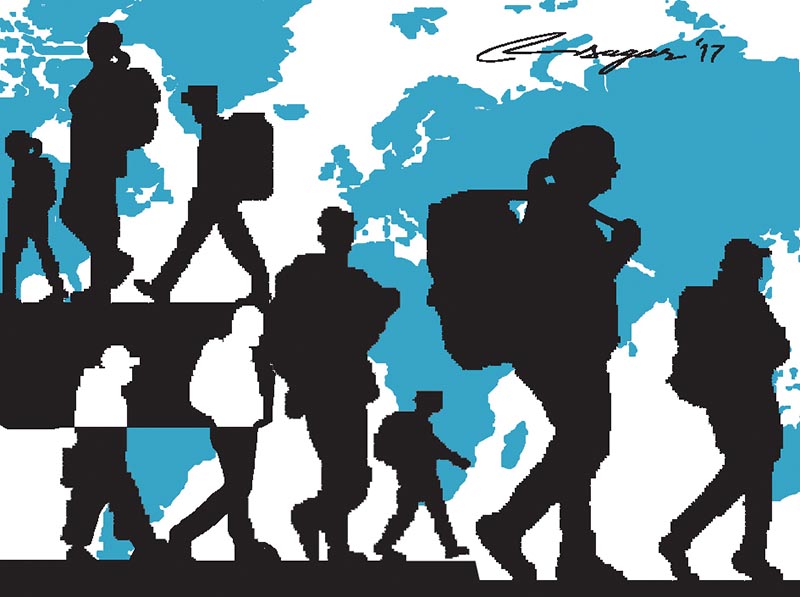Safe migration: Harnessing development potential
Nepal as the chair of Colombo Process, which is a regional consultative process on the management of overseas employment and contractual labour for countries of origins in Asia, has opportunities to enhance regional cooperation
Human migration is an age-old phenomenon. Largely, migration is considered movement of people, either within a country or across international borders. This is undoubtedly a global phenomenon which has profound socio-economic impacts on the lives of migrants and their families.
More notably, the International Conference on Population and Development held in Cairo in 1994, among others, has addressed issues related to internal and international migration. Since then, the scope of migration has expanded in national and international policy debates.
With the deepening globalisation, migration is largely intertwined with geo-politics, trade and cultural exchange, and provides societies with opportunities to benefit enormously. In this context, international migration has helped improve people’s lives in origin and destination countries, offering opportunities for millions of people worldwide to forge safe and meaningful lives abroad.
Over the years, we have experienced that a large share of migrants originate from rural areas. An estimated 40 per cent of international remittances are sent to rural areas, reflecting the rural origins of a large share of migrants.
Migration can generate very large benefits for migrants, their families and countries of origin. Thus, migration is increasingly seen as a high-priority policy issue by many governments, politicians and the broader public throughout the world.
According to World Migration Report 2018, the current global estimate is that there were around 244 million international migrants in the world in 2015, which accounts for 3.3 per cent of the global population. More importantly, this is a very small minority of the global population, meaning remaining within one’s country of birth overwhelmingly remains the norm.
Additionally, it is important to understand international migration and its various manifestations in order to effectively address evolving migration dynamics, while at the same time adequately accounting for the diverse and varied needs of migrants. Some of the underlying causes of migration are poverty, food insecurity, lack of employment, inequality, limited access to social protection, natural disasters and climate change.
In most of the developing countries, labour migration has increasingly become a livelihood strategy for vast majority of youths. This is primarily due to lack of opportunities for full employment and decent work in their home country. The national governments need to ensure that migrants have decent working conditions, and their fundamental human and labour rights are protected.
Migration is included for the first time in the global development framework, recognising well-managed migration’s integral role in and immense contribution to sustainable development. The Sustainable Development Goals (SDGs) are now driving policy planning and implementation across borders and across sectors, recognising the interlinkages between migration and development and the fundamental contributions of migrants.
Good migration governance and related policy should seek to advance the socio-economic wellbeing of migrants and society.
In addition, the global compact for safe, orderly and regular migration is a new development which primarily aims to address all aspects of international migration, including the humanitarian, development, human rights-related and other aspects; make an important contribution to global governance and enhance coordination on international migration.
In the current era of globalisation, the challenge confronting the global community is to govern migration to enable it to serve as a force for growth and development and to ensure the protection of the rights of migrants.
In this context, many migrant workers suffer from poor working and living conditions, with their rights as workers often undermined, especially if they are in an irregular situation. There is a clear need to address the social protection of migrant workers for their better livelihoods and dignified lives.
In order to ensure safe migration, there is an emerging need to enhance the capacity of governments and key ministries in countries of origin. This will greatly help address the root causes of migration and harness their development potential. Hence, implementation of migrant-sensitive policies and strategies should be the priority of national governments in countries of origin and destination.
Nepal as the chair of Colombo Process which is a regional consultative process on the management of overseas employment and contractual labour for countries of origins in Asia has now opportunities to enhance regional cooperation and partnership to ensure the protection and promotion of human rights of labour migrants.
Therefore, mainstreaming migration should be a priority agenda in national development policies and strategies. This is broadly defined as the process of assessing the implications of migration in poverty reduction strategy.
This will significantly help integrate migration issues at all stages of development planning, including design, implementation, and monitoring and evaluation.
Bhandari is a PhD candidate at Chulalongkorn University, Thailand






